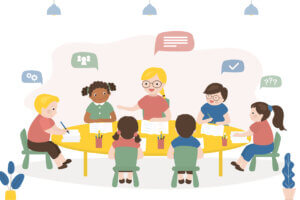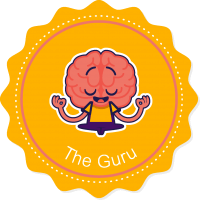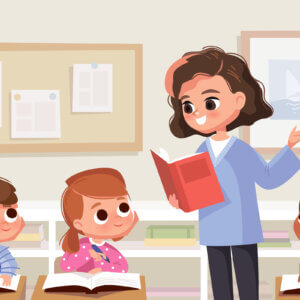
Dialogic Classroom is not a teaching strategy but a teaching approach which focuses on the use of dialogues as a strong fundamental tool for learning. Coined by Robin Alexander in the early 2000s, this approach has evolved over time to emphasize collaborative and supportive learning environments. In contrast to the traditional lecture-based teaching in classrooms, this approach encourages open-ended discussions. It is essential to understand that the ‘dialogic talk’ is just not any ‘classroom talk’; it is different from the regular classroom’s listening -telling or question-answer routines. The teacher, as the facilitator, encourages students to listen to each other, pose questions and justify responses, thus challenging their own thinking and learning, stimulating curiosity, and allowing them to construct knowledge collaboratively.
This approach creates a collaborative classroom environment where the students work together, learning from each other and be a part of a learning process which is dynamic and social. It also helps students build up a rich set of subject-specific vocabulary as they develop the ability to respect and evaluate different perspectives, enhancing their critical thinking skills along with their ability to articulate their responses better.
For the teachers, the dialogic approach brings in opportunity to build a stronger relationship with the learners as they create a collaborative, engaging and interactive learning environment. As the learners engage in meaningful discussions (viz, sharing, challenging, testing and supporting ideas), the teacher gets valuable insights into the learners’ thought process, thereby helping build the next steps of teaching-learning to support them further. This also helps the teacher to scaffold the discussion process further with the supportive prompts.
For educators, the Dialog approach creates opportunities for continuous assessment in the classroom. The teachers can understand how the learners are constructing the knowledge and understanding as they deep dive into the concepts. The learners get ample opportunity for self and peer assessment as they listen, respond, and reflect through the collaborative journey.
As with any teaching approach, the ‘Dialogic Classroom’ approach requires the teachers to play the key role in supporting students to present their arguments with sound reasoning as they together investigate topics and explore different perspectives while developing the skills of problem solving. Teacher needs to plan the process carefully to allow learners to sufficient time for paired and grouped discussions, supporting with sufficient time to discuss ‘incorrect answers’ to develop better understanding, scaffold, and prompt learners to think deeper by asking well formulated questions, while carefully keeping the teacher-led support to be minimum. It is also essential that the dialogues are balanced, and the reticent students have opportunities to participate and contribute.
Research-based evidence indicates that this approach has a positive impact on all learners as they develop strong communication skills along with the problem-solving skills through collaborative learning process. It’s adaptability across diverse subjects and age groups underscores its efficacy in fostering collaborative learning environments that progressively challenge students to engage in discussions and tackle complex issues.
Alka Pandey
Academic Advisor
Cambridge International Education





Yes, Dialogic classroom is more student centric approach.
Yes, dialogic classroom approach promotes interactive and collaborative learning.
Yes definitely dialog classroom approach involves critical thinking and develops skills like problem solving and promotes active learning.
Dialog classroom improves the cognitive abilites.develops a importance of listening and communicating.
It’s a space where students actively engage in meaningful conversations and foster critical thinking.
Dialogue class is just like a class-meeting wherein the approach is student centric
In a dialogic classroom students construct their own knowledge through active participation and continuous reflection.
Of course The Dialog technique in the classroom provides opportunities for continuous assessment. Teachers are able to see how pupils are expanding their knowledge and comprehension as they dig further into the subjects.
Teachers can update their skills and knowledge in education by participating in ongoing training programs and learning opportunities known as Continuous Professional Development
collaborative classroom environment where the students work together, learning from each other and be a part of a learning process which is dynamic and social. It also helps students build up a rich set of subject-specific vocabulary as they develop the ability to respect and evaluate different perspectives, enhancing their critical thinking skills along with their ability to articulate their responses better.
For indeed it builds teacher student relationship
Teacher or facilitator observing the students learnings.
Absolutely right !
Dialogic Classroom Approach fosters active engagement and collaboration, transforming traditional teaching into dynamic conversations where students’ voices are valued and critical thinking flourishes.
In a nutshell.
It’s an effective method of teaching wherein students are prioritised.
Dialogic Classroom is teaching approach which focuses on the use of dialogues as a strong fundamental tool for learning. I believe through the DC model TTT will automatically go down
Digital classroom transaction is a much proven reality of the era..
This approach builds a confident learner.
Dialogic approach encourages open-ended discussions and students can reflect their own knowledge and others. These conversations will develop collaborative skills and problem solving skills , also they can tackle complex issues.
This approach will also encourage the quite ones to present their arguments. It will help them overcome their fear or shyness or whatever is keeping them from getting involved and will encourage them to be more open towards classroom discussions.
This approach will also encourage the quiet ones to present their arguments. It will help them overcome their fear or shyness or whatever is keeping them from getting involved and will encourage them to be more open towards classroom discussions.
Absolutely spot on. The approach helps promote more confidence as students start exhibiting growth in expressive vocabulary knowledge. In the context of ESL, this works the best, however, one should be conscious of its differential effect on students with different vocabulary levels.
This approach encourages open-ended questioning, critical thinking, and collaborative learning, allowing students to explore ideas deeply, share perspectives, and construct knowledge collectively.